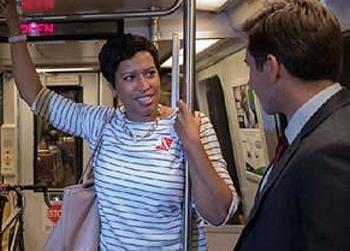
MEXICO CITY, Mexico, December 9, 2016 (ENS) – Mayors from cities across the United States are urging president-elect Donald Trump to recognize the “real and urgent threat that climate change poses to the world’s cities,” and to support them as they enact policies and programs to combat climate change.
Speaking at the C40 Mayors Summit in Mexico City last week, they said that if all U.S. cities pursue deep, rapid emissions cuts, they can contribute more than one-third of the cuts needed by 2025 to meet the commitments to the Paris Agreement made by the United States.
“One election doesn’t change who we are in cities in America,” said Washington D.C. Mayor Muriel Bowser. “As mayors and citizens we are determined to lead the way on facing the climate crisis.”

The C40 Cities Climate Leadership Group is a network of the world’s megacities taking action to reduce greenhouse gas emissions.
C40 is composed of 83 member cities around the world. On November 26, the former C40 Chairman, the 108th Mayor of New York City, Michael Bloomberg, was succeeded by Eduardo Paes, the Mayor of Rio de Janeiro, Brazil.
Drawing on a new C40 research report, “How US Cities Will Get The Job Done,” the mayors of Washington D.C., Austin, Seattle, Phoenix, and Portland, Oregon revealed that the 12 U.S. cities that are members of the C40 network have already taken nearly 2,400 individual actions to respond to climate change in the past decade.
From retrofitting buildings in New York City to make them more energy efficient, to the rollout of thousands of LED streetlights in Los Angeles, U.S. cities are using modern technology to slash their greenhouse gas emissions.
“The science hasn’t changed. The urgency hasn’t changed,” said Mayor of Boston and C40 Vice Chair Martin Walsh, speaking from Boston. “As mayors of cities at the frontlines of climate change, we have a continued responsibility to carry forward solutions – even more so today than yesterday.”
A report released previously at the Summit, “Deadline 2020,” concludes the next four years will determine whether the world can avoid the worst effects of climate change.
If the world fails to act, global temperatures cannot be kept below 1.5 degrees warming beyond pre-industrial levels, a key ambition of the Paris Agreement, negotiated in 2015 at the COP21 climate negotiations and formally adopted by more than 100 of the world’s countries. It took effect on November 4.
“Mayors don’t look at climate change as an ideological issue. They look at it as an economic and public health issue,” said C40 President of the Board and UN Secretary General’s Special Envoy for Cities and Climate Change and multi-billionaire Michael Bloomberg, who served as mayor of New York from 2002 through 2013.
“Regardless of the decisions of the incoming administration,” Bloomberg said, “U.S. mayors will continue to deliver action and lead the way.”
Current New York City Mayor Bill de Blasio, speaking from New York, said he will continue the fight against climate change.
“In New York City, we’ve concluded that environmental sustainability and economic sustainability must walk hand in hand, and that growing economic inequality in our city - mirrored throughout our nation and across the globe - threatens the strength and humanity of our communities,” de Blasio said.
“We will continue to act with urgency in concert with our C40 partners to cut our carbon emissions and do our part to keep the rise in average global temperature below 1.5 degrees Celsius,” he said. “The cost of prevention pales in comparison to cost of inaction, in terms of dollars, property and human life.”
The research found that one in five Americans now live in a C40 city and U.S. cities are the most collaborative of any region globally.
“We hope that President-Elect Trump can be convinced to join us in providing this global leadership city leaders cross America are already showing, said Charlie Hales, mayor of Portland, Oregon. “But if he doesn’t we will not be slowed down, with or without the support of the White House. The risks of not acting are just too severe.”
In recent years, cities, working together with national governments, have demonstrated that it is possible to tackle climate change while growing economies.
President Barack Obama’s Administration has made considerable progress, the mayors acknowledged, launching programs like the Better Buildings Initiative to support cities looking for clean energy options and energy-efficient transportation systems; starting the Our Cities, Our Climate initiative with Mayor Bloomberg and U.S. Secretary of State John Kerry; and achieving a goal of having 100 U.S. cities sign on to the Compact of Mayors – now the Global Covenant of Mayors for Climate and Energy.
Trump, who has called climate change a “Chinese hoax,” admitted to the “New York Times” earlier this month that there is “some connectivity” between human activity and climate change.
Trump has met in recent days with climate change expert former Vice President Al Gore and environmental activist actor Leonardo DiCaprio.
But any hope within the environmental community aroused by these meetings was dashed on Wednesday, when Trump nominated Oklahoma Attorney General and climate denier Scott Pruitt to head the Environmental Protection Agency.
Copyright Environment News Service (ENS) 2016. All rights reserved.
© 2016, Environment News Service. All rights reserved. Content may be quoted only with proper attribution and a direct link to the original article. Full reproduction is prohibited.
